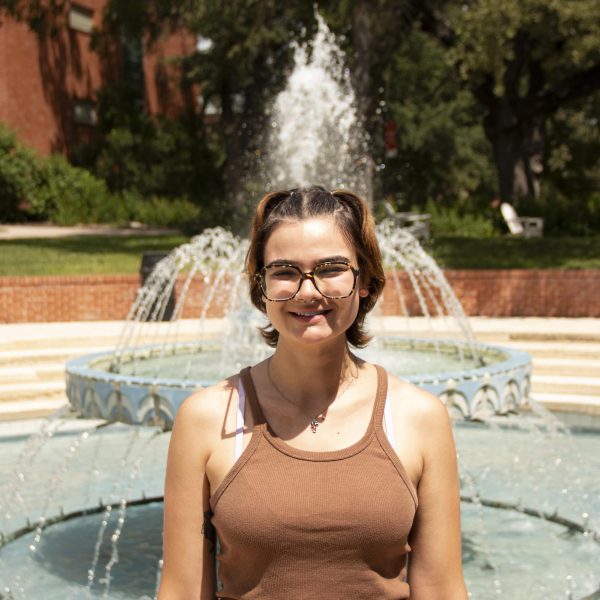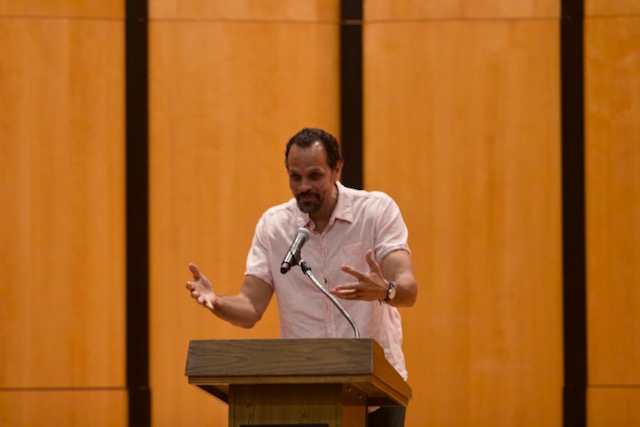Ross Gay spreads delight at reading
Poet and writer Ross Gay visited campus for a prose reading, Q&A and book signing
Ross Gay introduces himself at the Ross Gay lecture event.
On Tuesday Feb. 21, Ross Gay, poet and creative nonfiction writer, visited Trinity as a part of the annual Stieren Arts Enrichment Series (SAES) for the English program. The English department held a Q&A with Gay on Tuesday afternoon in Dicke Hall, and that evening, he gave a reading in the Ruth Taylor Recital Hall, followed by a book signing in the foyer.
Gay focuses on the positive aspects of life in his writing, even while discussing darker topics, and his reading reflects this. He began the reading with an essay titled “Through my Tears I Saw” from his recently published collection of essays, “Inciting Joy.”
He then recited “Tomato on Board,” “The Marfa Lights” and “Nicknames” from his collection “The Book of Delights.” He also gave attendees a peek at a new work, “Braces on Adults.”
SAES brings in six writers each year for the arts at Trinity. Andrew Porter, professor of English and director of the creative writing program at Trinity, collaborated with two other English professors, Kelly Carlisle and Jenny Browne, to present Gay.
“With this series, we tend to rotate the speakers by genre: fiction, nonfiction and poetry every three years, and this was a nonfiction year,” Porter said. “Ross Gay was our first choice, and we were thrilled that he was able to make time to come here. It also coincided with the release of his book.”
Gay’s reading brought in many from both Trinity and the San Antonio community, but it was especially aimed at those in creative writing classes at Trinity.
“We knew we wanted to bring a big name, and we knew we wanted to bring someone who would draw a good audience from our community and from campus,” Porter said. “We were thinking about our creative writing courses — our creative writing students. [Ross Gay is] both a poet and a nonfiction writer, and so professor Browne is able to teach his poetry in her poetry classes and Dr. Carlisle’s been able to teach [his] nonfiction.”
Gay’s constant consideration of joy and delight in his work came into play with the English department’s reasoning for picking Gay. Porter expressed that it wasn’t stated explicitly in their discussions, but in the face of the COVID-19 pandemic, he realized the topic of delight was necessary.
“I don’t know if any of us were thinking about it consciously, but coming out of being on Zoom for a couple years, I think that … informed our decision to bring someone to campus whose work is so much about celebrating life and celebrating small moments in life,” Porter said.
Students who went to the reading asserted that his discussion of delight was their main focus while listening, too.
Grace Magavern, junior biology and environmental studies double-major in Browne’s poetry writing course, recalled a specific essay that epitomizes his conversation about joy.
“Hearing his longer prose read aloud today was really incredible,” Magavern said. “I especially loved his story about his little tomato plant on the airplane because I really think it encapsulates his ability to make something so small and maybe seemingly insignificant … really beautiful. And something so small transcends that.”
Macks Cook, senior English major and student in Carlisle’s advanced nonfiction class and Browne’s ekphrastic poetry class, took notice of the importance behind his seemingly trivial delights, too, and remarked on the value of these small details.
“I think [Gay’s writing] is extremely valuable, especially to hear his perspective that is so [much] about joy and taking note of joy and wonderful things in everyday life,” Cook said.
Gay’s approach toward the small moments of bliss in life still addresses larger issues, like racism, grief and misogyny, and Kim Granados, junior English major who introduced Ross Gay before his reading, appreciated this about Gay’s writing.
“In some of his works, he confronts … systemic oppression, but … he still has hope, so I think that’s really important,” Granados said.
Gay brings this hope to the realm of creative writing too, and Cook relays the importance of this unique perspective.
“[Contemporary writing] can be kind of a downer, but this idea of having a practice that’s all about amplifying the joy and the good and not trivializing that, I think that’s really important work,” Cook said.

Hi! My name is Samara Gerstle (she/her), and I’m the managing editor of the Trinitonian. I’m a junior English major with minors in creative writing...







